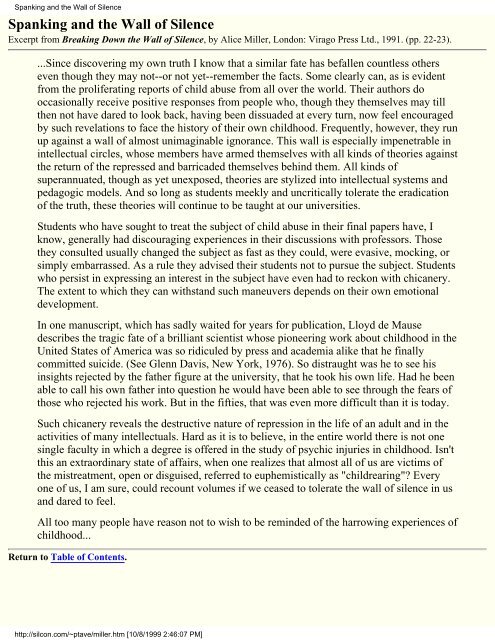spanking - Unauthorized web page
spanking - Unauthorized web page
spanking - Unauthorized web page
Create successful ePaper yourself
Turn your PDF publications into a flip-book with our unique Google optimized e-Paper software.
Spanking and the Wall of Silence<br />
Spanking and the Wall of Silence<br />
Excerpt from Breaking Down the Wall of Silence, by Alice Miller, London: Virago Press Ltd., 1991. (pp. 22-23).<br />
...Since discovering my own truth I know that a similar fate has befallen countless others<br />
even though they may not--or not yet--remember the facts. Some clearly can, as is evident<br />
from the proliferating reports of child abuse from all over the world. Their authors do<br />
occasionally receive positive responses from people who, though they themselves may till<br />
then not have dared to look back, having been dissuaded at every turn, now feel encouraged<br />
by such revelations to face the history of their own childhood. Frequently, however, they run<br />
up against a wall of almost unimaginable ignorance. This wall is especially impenetrable in<br />
intellectual circles, whose members have armed themselves with all kinds of theories against<br />
the return of the repressed and barricaded themselves behind them. All kinds of<br />
superannuated, though as yet unexposed, theories are stylized into intellectual systems and<br />
pedagogic models. And so long as students meekly and uncritically tolerate the eradication<br />
of the truth, these theories will continue to be taught at our universities.<br />
Students who have sought to treat the subject of child abuse in their final papers have, I<br />
know, generally had discouraging experiences in their discussions with professors. Those<br />
they consulted usually changed the subject as fast as they could, were evasive, mocking, or<br />
simply embarrassed. As a rule they advised their students not to pursue the subject. Students<br />
who persist in expressing an interest in the subject have even had to reckon with chicanery.<br />
The extent to which they can withstand such maneuvers depends on their own emotional<br />
development.<br />
In one manuscript, which has sadly waited for years for publication, Lloyd de Mause<br />
describes the tragic fate of a brilliant scientist whose pioneering work about childhood in the<br />
United States of America was so ridiculed by press and academia alike that he finally<br />
committed suicide. (See Glenn Davis, New York, 1976). So distraught was he to see his<br />
insights rejected by the father figure at the university, that he took his own life. Had he been<br />
able to call his own father into question he would have been able to see through the fears of<br />
those who rejected his work. But in the fifties, that was even more difficult than it is today.<br />
Such chicanery reveals the destructive nature of repression in the life of an adult and in the<br />
activities of many intellectuals. Hard as it is to believe, in the entire world there is not one<br />
single faculty in which a degree is offered in the study of psychic injuries in childhood. Isn't<br />
this an extraordinary state of affairs, when one realizes that almost all of us are victims of<br />
the mistreatment, open or disguised, referred to euphemistically as "childrearing"? Every<br />
one of us, I am sure, could recount volumes if we ceased to tolerate the wall of silence in us<br />
and dared to feel.<br />
All too many people have reason not to wish to be reminded of the harrowing experiences of<br />
childhood...<br />
Return to Table of Contents.<br />
http://silcon.com/~ptave/miller.htm [10/8/1999 2:46:07 PM]






